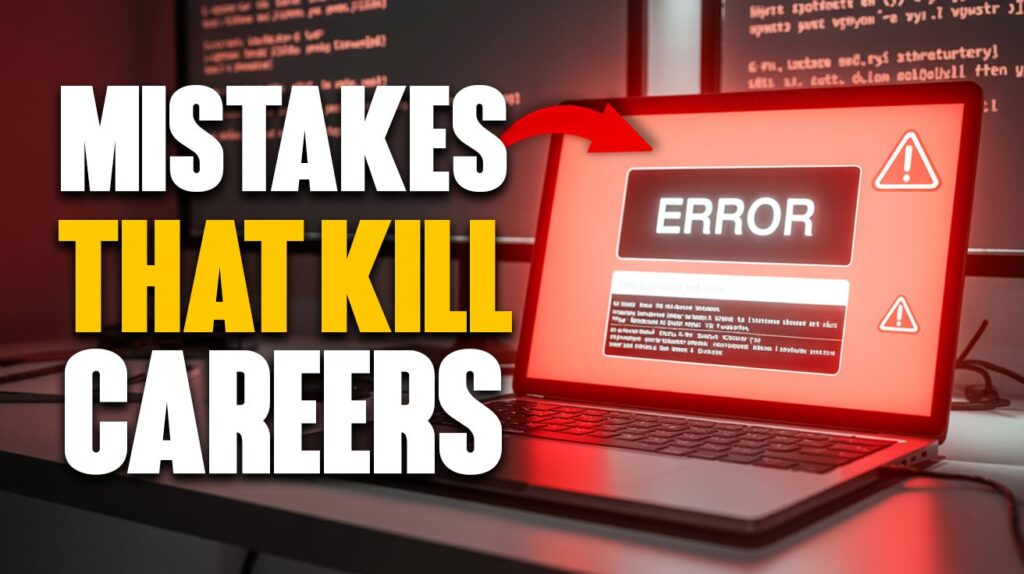
Many beginners mistakenly think they need a Batcave full of certifications before even sniffing around cybersecurity jobs. Truth is, waiting for that “perfect” moment is like waiting for Godot—you’ll just be standing there forever. Think of applying early as intel gathering: you get to practice those interview Jedi mind tricks and sniff out what employers are really looking for. Landing that first gig isn’t about knowing everything; it’s about showing you can learn, because the cybersecurity landscape changes faster than Taylor Swift’s relationship status.
1. Waiting Too Long to Apply for Jobs

Ready is a myth, like pants that fit perfectly right off the rack.
Many beginners mistakenly think they need all the certifications or 10 years experience before even tossing their hat in the ring. But that’s like waiting until you’ve mastered every dish before opening a restaurant.
You should be starting those applications now—yes, now. Early applications give you interview practice, employer feedback, and a confidence boost, which is way more valuable than memorizing another textbook. Entry-level cybersecurity gigs are designed for learning on the job anyway. So, ditch the imposter syndrome, polish up that resume, and start applying today.
2. Trying to Qualify for All Jobs

Better to hone a specific skillset because depth trumps breadth.
Do you think you need to be a cybersecurity Swiss Army knife? Aspiring to meet every requirement on every job posting feels noble—until it’s just exhausting. If you’re spreading yourself thinner than airplane coffee, maybe dial it back.
Some organizations are ditching the old “degree required” nonsense, now eyeing candidates with practical chops and killer communication skills. Instead of hunting certifications like Pokémon, specialize in cybersecurity subsets like, network security, ethical hacking and security analysis.
3. IT Foundation Fallacy

You don’t need to be Linus Torvalds to lock down a network.
Some newbies sweat about not knowing enough IT, thinking they need a deep dive before even sniffing at cybersecurity. But that’s like saying you need to build a car from scratch before driving one—totally bogus. While foundational knowledge helps, curated cybersecurity programs often provide the essentials for entry-level gigs.
Plenty of successful cybersecurity pros come from diverse, even non-IT, backgrounds. Focus on nailing down networks, operating systems, and security tools, plus lots of hands-on practice. Remember, GRC roles don’t require technical wizardry, so if you’re hesitant due to a non-IT background, just concentrate on the relevant skills.
4. Not Attending Cybersecurity Events

Schmoozing at events can lead to job opportunities and mentorship.
Many cybersecurity beginners skip industry events, which is like refusing free tequila shots at a party. You miss out on the latest trends, tools, and threats, but more importantly, these events offer prime networking opportunities—which, let’s be honest, can feel about as appealing as parallel parking in San Francisco.
BSides events, for example, are valuable for mingling. So, even if you’re the type who’d rather battle a boss-level video game than make small talk, remember, every handshake could unlock a career boost. Think of it as leveling up, but IRL.
5. Obsessing Over Specialization Early

Exploration is key, so chill out and enjoy the ride.
“What do you want to be when you grow up?” is a loaded question, even for adults. When it comes to cybersecurity, fixating on the perfect niche upfront can be as useful as putting the cart before the server. Ethical hacking isn’t a life sentence, folks.
Think of specializations as flavors at a tech buffet; sample a few before loading up on the General Tso’s of GRC (Governance, Risk, and Compliance—the non-technical side of cybersecurity, for those not in the know). Broad experience is valuable, specializations evolve, and your career direction might change more often than your Zoom background.
6. Skipping Hands-On Practice

Cybersecurity is like learning to play guitar by reading sheet music—without ever touching the instrument.
Newbies often focus on theory, forgetting that you can’t defend a network armed only with definitions of “phishing” and “firewall.” Cybersecurity involves networking, coding, and operating systems, all of which sound about as fun as a root canal until you dive in.
Building a home lab, using Hack The Box, and TryHackMe for cybersecurity challenges turns abstract concepts into real-world scenarios. Setting up a home lab can make learning about networking as exciting as a TikTok collab—at least for tech enthusiasts.
7. Lack of Documentation

Documenting progress is like creating a breadcrumb trail through the forest of code.
Some cybersecurity beginners treat documentation like that gym membership they swear they’ll use. Keeping detailed notes—using the right tools and methods—isn’t just about showing off your skills. It creates a valuable resource for future reference, which is more useful than that sourdough starter kit from 2020.
Employers recognize that communication skills are often prioritized over narrowly technical skills for entry-level hires, so start keeping detailed notes now. This helps troubleshoot problems and allows you to share insights and solutions with others. Plus, it’s way more impressive than claiming you binge-watched Mr. Robot.
Last modified: September 19, 2025







